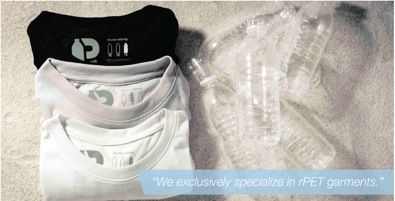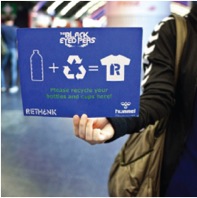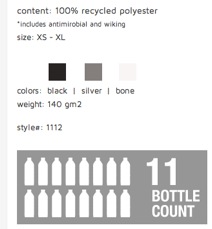How many plastic bottles are in YOUR t-shirt? Mine is composed of about a dozen. Also, I’d venture to say that it’s probably more comfortable than yours. Lies, you say? Well, keep reading and prepare to be amazed.

ReThink Fabrics is a Seattle-based r-PET clothing brand that is educating the public on rethinking waste and clothing. Having made an appearance in New York Fashion Week, been featured in the eco-friendly Black Eyed Peas (Energy Never Dies) tour, and partnered with Hummel to produce a recycled apparel collection, ReThink is off to a forceful start. However, there is still a lot of work to be done.
So what is r-Pet? Polyethylene Terephthalate is all around us. We drink out of it, use it for food storage, and, in a more recent evolutionary step, wear it. Commonly referred to as “PET” or “PETE,” polyethelene terephthalate can be used to make the average plastic bottle, which accounts for a significant portion of the world’s waste. Fortunately PET is recyclable. Recycled PET is referred to as r-PET. In the context of textile applications, PET is typically referred to by its common name, polyester.

The few companies that produce eco-friendly clothing have traditionally geared promotional efforts toward wealthy buyers. However, ReThink Fabrics prides itself on its environmentally friendly, socially responsible business model for producing more affordable clothing. “Our goal has always been to have [r-PET polyester clothing] mainstreamed. It’s not Patagonia, where you have to pay $200 for a jacket. No, I want this to be the standard for all polyester.” said Rethink Fabrics CEO, Anne Sodemann, who believes that educating the public is a main component of promoting eco-friendly fashion.
Although the masses are still somewhat unaware of what r-PET is and the advantages to purchasing recycled polyester over traditional fabrics, Sodemann and her team at ReThink have made efforts to educate the general population as it builds a brand presence. “I definitely think that we have helped educate the public, not just about the possibility of [r-PET polyester], but I like to think that we have also changed or at least contributed to their ability to rethink waste, whether it’s plastic [or] paper. [We’ve encouraged companies to] try to design it so that it serves a purpose beyond the trash can,” said Sodemann. She was recently asked to speak about how manufacturers can design recyclable trash packaging at a conference as part of a panel for waste management.

While the eco-friendly advantages to purchasing recycled polyester clothing are obvious (and articulated clearly on the company’s website, these t-shirts also provide anti-microbial benefits and wicking. Considering that one of the fabric’s main components is plastic, the garments are also extremely soft. When asked if the brand would attempt to expand their product line into areas other than clothing, Sodemann said, “Our fabric developers have really done a tremendous job. It’s really about just having a few product offerings and just focusing on what you’re good at. That’s the business strategy and that will continue to be the business strategy. Sometimes less is more.”
When buying apparel on the company website, each product description states how many plastic bottles are used in the design and the percentage of recycled polyester is used in the clothing. Additionally, Rethink Fabrics provides metrics for companies to track their efforts when products are purchased. The measurements can be applied to environmental impact statements as carbon offset. From its genesis until now, ReThink Fabrics has worked not only to produce and socially responsible and environmentally friendly product, but also to make the product benefit the customer beyond providing comfortable, sensible garments. Therefore, businesses and individuals can now indulge in responsible, affordable clothing purchases, track their impact, and benefit from the advantages of wearing comfortable, quality attire.